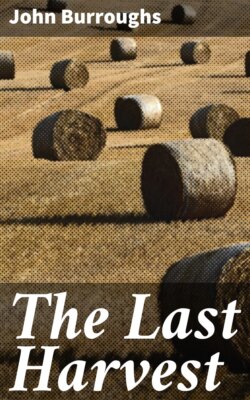Читать книгу The Last Harvest - John Burroughs - Страница 10
На сайте Литреса книга снята с продажи.
IV
ОглавлениеTable of Contents
Apart from the account of his travels and other personal experiences, the Journals are mainly made up of discussions of upwards of fifty subjects of general and fundamental interest, ranging from art to war, and looked at from many and diverse points of view. Of these subjects three are dominant, recurring again and again in each volume. These are nature, literature, and religion. Emerson's main interests centered in these themes. Using these terms in their broadest sense, this is true, I think, of all his published books. Emerson was an idealist, first, last, and all the time, and he was a literary artist, or aimed to be, first, last, and all the time, and in the same measure and to the same extent was he a devout religious soul, using the term religion as he sometimes uses it, as a feeling of the Infinite.
There are one hundred and seventy-six paragraphs, long and short, given to literature and art, and one hundred and sixty given to religious subjects, and over thirty given to nature. It is interesting to note that he devotes more paragraphs to woman than to man; and more to society than to solitude, though only to express his dislike of the former and his love for the latter. There are more thoughts about science than about metaphysics, more about war than about love, more about poetry than about philosophy, more on beauty than on knowledge, more on walking than on books. There are three times as many paragraphs on nature (thirty-three) as on the Bible, all of which is significant of his attitude of mind.
Emerson was a preacher without a creed, a scholar devoted to super-literary ends, an essayist occupied with thoughts of God, the soul, nature, the moral law—always the literary artist looking for the right word, the right image, but always bending his art to the service of religious thought. He was one of the most religious souls of his country and time, or of any country and time, yet was disowned by all the sects and churches of his time. He made religion too pervasive, and too inclusive to suit them; the stream at once got out of its banks and inundated all their old landmarks. In the last analysis of his thought, his ultimate theme was God, and yet he never allowed himself to attempt any definite statement about God—refusing always to discuss God in terms of human personality. When Emerson wrote "Representative Men" he felt that Jesus was the Representative Man whom he ought to sketch, "but the task required great gifts—steadiest insight and perfect temper; else the consciousness of want of sympathy in the audience would make one petulant and sore in spite of himself."
There are few great men in history or philosophy or literature or poetry or divinity whose names do not appear more or less frequently in the Journals. For instance, in the Journal of 1864 the names or works of one hundred and seventeen men appear, ranging from Zeno to Jones Very. And this is a fair average. Of course the names of his friends and contemporaries appear the most frequently. The name that recurs the most often is that of his friend and neighbor Thoreau. There are ninety-seven paragraphs in which the Hermit of Walden is the main or the secondary figure. He discusses him and criticizes him, and quotes from him, always showing an abiding interest in, and affection for, him. Thoreau was in so many ways so characteristically Emersonian that one wonders what influence it was in the place or time that gave them both, with their disparity of ages, so nearly the same stamp. Emerson is by far the more imposing figure, the broader, the wiser, the more tolerant, the more representative; he stood four-square to the world in a sense that Thoreau did not. Thoreau presented a pretty thin edge to the world. If he stood broadside to anything, it was to nature. He was undoubtedly deeply and permanently influenced by Emerson both in his mental habits and in his manner of life, yet the main part of him was original and unadulterated Thoreau. His literary style is in many respects better than that of Emerson; its logical texture is better; it has more continuity, more evolution, it is more flexible and adaptive; it is the medium of a lesser mind, but of a mind more thoroughly imbued with the influence of the classical standards of modern literature. I believe "Walden" will last as long as anything Emerson has written, if not longer. It is the fruit of a sweeter solitude and detachment from the world than Emerson ever knew, a private view of nature, and has a fireside and campside quality that essays fashioned for the lecture platform do not have. Emerson's pages are more like mosaics, richly inlaid with gems of thought and poetry and philosophy, while Thoreau's are more like a closely woven, many-colored textile.
Thoreau's "Maine Woods" I look upon as one of the best books of the kind in English literature. It has just the right tone and quality, like Dana's "Two Years Before the Mast"—a tone and quality that sometimes come to a man when he makes less effort to write than to see and feel truly. He does not aim to exploit the woods, but to live with them and possess himself of their spirit. The Cape Cod book also has a similar merit; it almost leaves a taste of the salt sea spray upon your lips. Emerson criticizes Thoreau freely, and justly, I think. As a person he lacked sweetness and winsomeness; as a writer he was at times given to a meaningless exaggeration.
